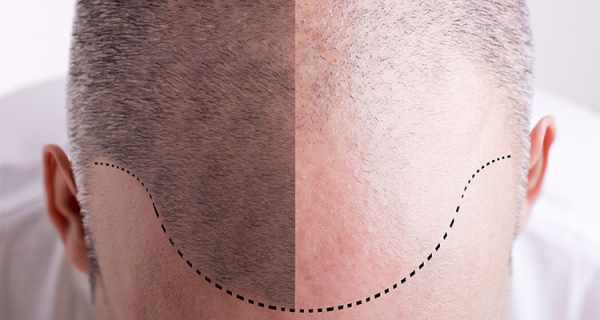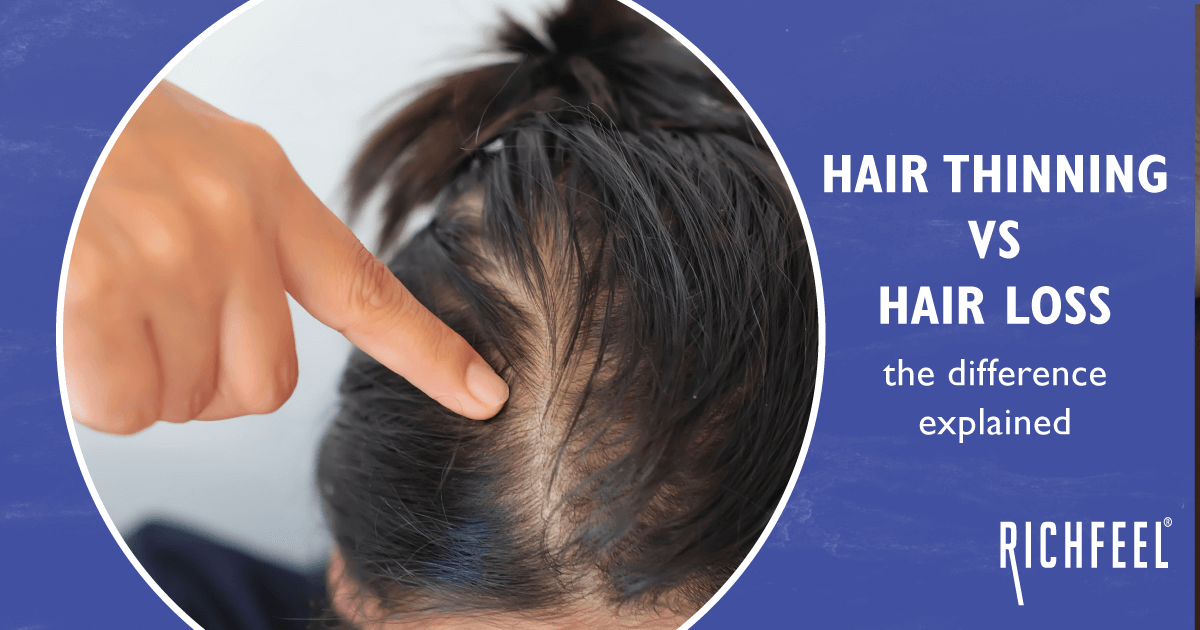Cancer – dreaded by all, comes with a lot of concerns on the sidelines, varying in the degree of distress perhaps. Hair loss is one such related distressing side effect. It may not be top of the mind until you are in fact facing it. But a reality to deal with nonetheless.
The probability of facing hair loss is high if you have to undergo chemotherapy or radiation therapy. This is something that affects both men and women diagnosed with the unfortunate disease. Hair loss is perhaps the most evident outward symbol, so to speak, to the world, screaming out loud that you have cancer. Every glance in the mirror is a reminder to you, of what you are going through. Distressing indeed.
So how do you deal with this inevitable situation? The key lies in understanding why it happens, how much it affects and taking professional help in growing your hair back or with solutions that can help camouflage the loss.
Hair loss due to cancer, as a side effect of therapy, is usually temporary in nature. With due intervention, in most cases, you can have your hair back. A very small fraction of people, who undergo chemotherapy, may not be able to regrow their hair. This is due to some specific drugs that increase the risk of permanent hair loss. Your doctor will be able to give you heads-up on what to expect.
Let us delve deeper into this.
Why does it occur?
It is not cancer in itself that causes hair loss, but the chemotherapy or radiation therapy and accompanying medications that lead to this situation.
What does chemotherapy actually do? The drugs used in the therapy are very powerful formulations that attack rapidly growing cancer cells. However what happens on the sidelines, unfortunately, is that these drugs also attack other healthy cells in your body — including those in your hair follicles. And it’s not just the follicles on your scalp, but also in other parts of your body – eyelash, eyebrows, armpit, pubic and other regions. Hair thus falls out.
What should you expect?
In most cases, the doctor attending to you will counsel you on what all to expect. Hair loss could be one of the side effects that you may face. Your doctor is the right person to give you details on what dosage of drugs you will be receiving and whether hair loss can be expected. And if so, to what extent – whether temporary or permanent.
Usually, hair may start falling out 10 to 14 days after you start your treatment. It then continues through the course of your treatment and for a few weeks afterwards as well. You will notice, hair thinning, hair fall and perhaps scalp tenderness as well. Some drugs administered during chemotherapy lead to complete baldness.
Effect of Chemotherapy/ Radiotherapy on Hair
Both radiation therapy and chemotherapy can affect your hair. Radiotherapy concentrates on a specific region for treatment. Its side effects, too pertain mostly to a particular region, unlike chemotherapy. If you have radiation near your head, you are most likely to lose hair on the head.
The amount of hair loss and its regrowth will depend on the treatment. Different types of radiation and different dosages will have different effects on your hair, with very high doses that may even lead to permanent hair loss. As regards chemotherapy, as mentioned above, in most cases it is temporary hair loss.
Hair loss depends on the type of drug used, the dosage, the timing of treatment frequency and also the length of the treatment. This apart, there are personal factors which come into play.
It is to be noted that all chemotherapy drugs do not cause hair loss. It depends on the specific drug used, and the dosage administered. Not to mention, each individual reacts to the drugs differently. The effect also varies from person to person. While some may notice some gradual thinning, some may see clumps of hair falling off and some grow bald quite rapidly. The extent of hair loss also depends on the timing and length of treatment sessions. When administered in a frequent cycle and in small doses, the hair loss may be minimal.
This apart, certain kinds of cancer treatment involves hormonal therapy which can also result in hair concerns. In such case usually one notices hair thinning and hair fall, but not complete baldness.
How can you tackle the hair loss?
Hair loss cannot be prevented completely in such circumstances, but can surely be managed.
So far no process or treatment or solution has been designed which can help in preventing hair loss while undergoing chemotherapy sessions. But these are few things that one can follow to lessen the damage.
Caring for your hair the right way, through the course of the treatment, as well as for the period of recovery thereafter, can make a difference.
- Pick a hair care regimen, in consultation with your hair doctor, that would help maintain and promote hair growth.
- Stay away from commercially sold shampoos that are strong and contain chemicals for fragrance, alcohol, or salicylic acid. Use prescribed hair care products only, as guided by your trichologist.
- Stay away from using styling equipment and products. No perming or straightening for a while.
- Avoid hair colouring. Hair colours contain peroxide, ammonia, forms of lacquer, and other chemicals that can irritate the scalp and damage the hair.
- Do not use hot rollers or straighteners, or any such equipment that applies heat on the hair shaft.
- Use a soft-bristled hairbrush and comb gently.
- Towel and air-dry your hair after a wash. Avoid blow dryers.
- Go for a shorter hairstyle for a few months. Shorter hair won’t lie flat on your scalp and will give a fuller look.
- Take due care of your scalp. It may get itchy and very tender. Have it attended to as guided by your trichologist.
- Use a silk pillowcase. It will reduce friction when you are asleep and help minimise hair fall.
- Wearing a soft cap or turban around your head when you sleep can help collect loose hair as it falls out.
- Do not wear tight headgear or wear your hair in any tight manner that can put a strain on the hair follicles. Hair shouldn’t be tugged.
- Cover your hair when you step out in the sun or in the cold.
- Do consider going in for customisable hair systems. Not wigs. Your hair doctor and a professional stylist can help you get one that will suit you and your lifestyle best.
- Make the best of your look! Don’t let your tresses stress you out, making matters worse! Leave your hair worries to your trichologist and rebuild your confidence & life!
When will Hair regrow?
Hair regrowth depends on multiple factors. In cases where there is permanent hair loss, hair regrowth is not an option and one will need to go for other solution like non-surgical hair replacement systems.
Where it is temporary hair loss, you can expect your hair to regrow in about 3 to 6 months after your treatment ends, provided it’s cared for right. However, your hair may feel different in texture or may have a different shade. It grows at a pace of quarter-inch every month. One can expect a scalp full of hair after six months to one year of stopping the chemotherapy medications.
It is to be noted that the hair that grows back may not be as strong as it was before. It may be thinner than before, and maybe prone to breakage. Haircare under the guidance of a trichologist, as discussed above, can help you grow it right.
How can Trichologists help?
It is fairly clear from the discussions above on how a trichologist’s role can help throughout the process of treatment and recovery.
A trichologist is the right person to guide you on your hair care during the treatment, and more importantly afterwards when you are trying to regain your hair. Thanks to the advancements in the field of trichology there are various treatments and solutions now available, to help tackle hair thinning, hair fall, to regrow lost hair, and support with customisable hair systems in case of irreversible hair loss.
Trichology, with the solutions it offers, can play a great role in tendering the right care and in making sure that pride & confidence are restored to you. Extensive hair loss and baldness create mental & sociological stress which needs great support to deal with. Friends, family and professionals together can help handle the situation successfully, and help you come out of it confidently.
Your trichologist is the most important person for your hair needs especially when you are out of your cancer treatment. Be it any hair and scalp related concern that has been triggered by your entire experience with the disease, the trichologist is the right person to approach, to draw a clear diagnosis and guide with a way forward. Do not hesitate to walk in for a consultation.
And as we always remind, problems and nature of hair fall/loss, vary from person to person, and so should the solution. What you need is not what your neighbour may need, though to you the problem may seem the same!
At RichFeel, we have pledged to help cancer patients get their confidence back. Through the Look Good Feel Better and Drop the Scarf programs, RichFeel enriches the lives of the cancer patients, providing newfound confidence, while recognizing those who have supported them all the way. Through these initiatives, free external application for patients who have undergone chemotherapy and free hair systems for patients who have undergone radiotherapy is given. Do reach out to our clinics for any support that you may need!
With that, we sign off for now! For all things ‘Hair’, do follow our blogs on hair loss, hair care, treatments and solutions and interesting hair trivia!
Connect with us on social media on the links below. Do leave your questions & comments and we will address them all, just as we have done today!



